
Dear friends,
The Asian Human Rights Commission (AHRC) has received information from Task Force Detainees of the Philippines-Mindanao (TFDP) that the houses and properties, including the farms and trees of 28 families (137 villagers) were illegally demolished from the land they had lived on for more than 50 years in Bukidnon Province, Mindanao. The sheriff who commanded the destruction of all 28 families ignored a court order to exclude 11.5 out of 16.9 hectares, and furthermore he did not inform the villagers before the demolition. Consequently, all the victims currently suffer from lack of food and livelihood and are living in make-shift shelters. In particular, the children are extremely exposed to food and health insecurity. The victims filed complaints with the law enforcement agencies as well as other relevant government authorities. However their right to life is under threat and they are being neglected by the government.
CASE DETAILS:
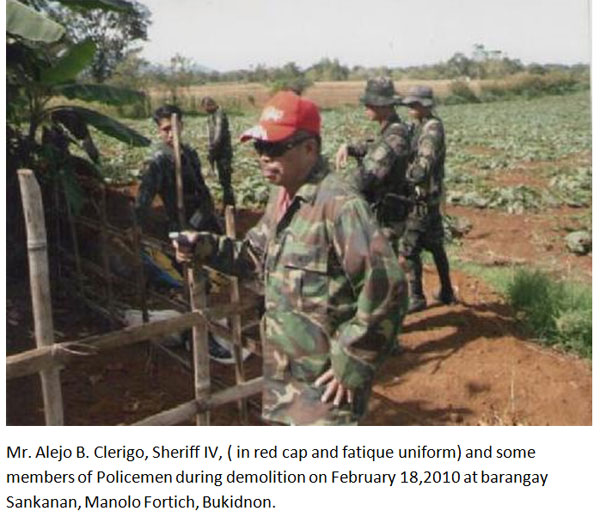
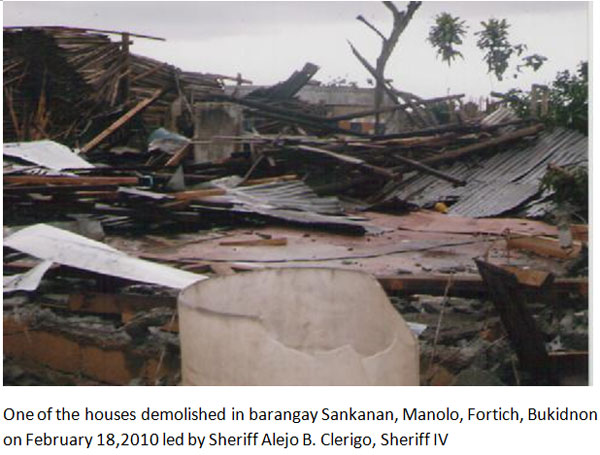
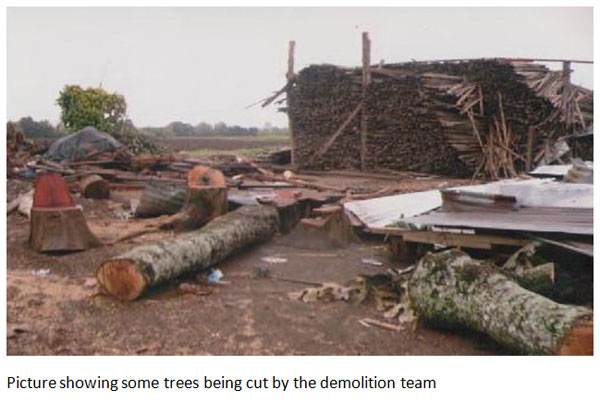
In the early morning of February 18, 2010, Sheriff Alejo Clerigo accompanied by members of the Police Provincial Mobile Group and a demolition team, or approximately one hundred persons commanded the demolition of the houses and properties of 137 villagers (28 families) living in Sankanan village of Bukidnon.
They destroyed 22 houses, agricultural plants and trees, including 49 fruit trees, supplies, stockrooms, fertilizers, and water tanks. In addition, the bulldozer destroyed 7.5 hectares of land on which the villagers had grown cassava, corn and vegetables and which were ready to be harvested. The estimated value of the houses and property demolished alone amounts to PHP 7,539,500 (USD 166,447); PHP 6,425,000 (USD 141,847) for the houses and PHP 1,114,500 (USD 24,600) for other agricultural property.
One of the inhabitants, Ms. Glorai Penar, begged the sheriff not to proceed, arguing that they were waiting for the Court of Appeals to examine their case. The sheriff deliberately ignored her objection and ordered the demolition. On the following day, Sheriff Alejo Clerigo accompanied by approximately fifty persons both from the Police Provincial Mobile Group and from the demolition team, came back to remove the farm plants with a bulldozer and complete the demolition of the houses.
Before the demolition, some villagers were tilling their farmland and planting corn, vegetables and other cash crops. Other were raising chickens and goats. Those who work in the 4.5 hectares farmland cultivating squashes as plantation labourers expected to harvest their produce later in the month. However, everything was destroyed.
The children are particularly exposed to the most vulnerable situation. As the diurnal range from day to night is stark-with vast differences in temperature as the day progresses, the children get cold and may be exposed to the unhygienic environment which will in turn weaken their immune systems if the current situation lasts much longer. The victims who lost their farmland, which is their only source of income and those who worked at plantation find it difficult to manage daily food and life. Some work as contractual labourers in the Del Monte plantation and others work in nearby farms. The victims manage to work three days per week from which they manage PHP 100 (USD 2.2) per day.
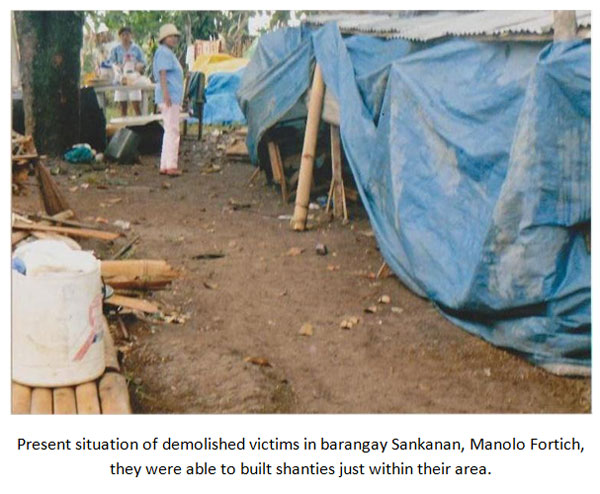
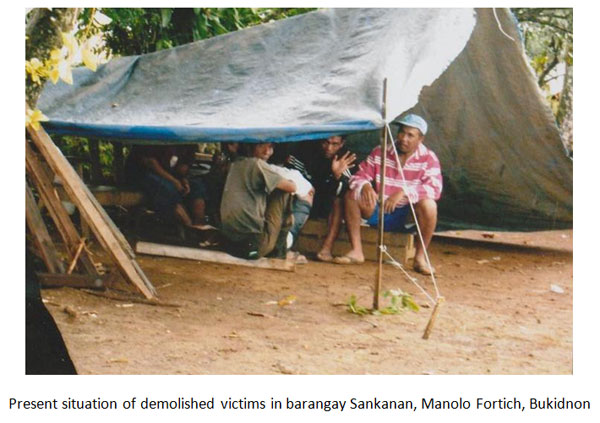
According to the legal documents collected, 11.4 out of 16.9 hectares are not included in the lawsuit on the land that has been furthermore suspended by the Declaratory Relief with prayer for the issuance of Preliminary Injunction or Temporary Restraining Order (TRO) by the villagers. A total of 13 families composing of 61 persons are hence victimized irrespective of the lawsuit. Ignoring the legal process, Sheriff Alejo Clerigo destroyed everything in those areas resulting in the threat to the right to life of the villagers who have lived in the area for more than 50 years.
By March 22, 2010, all victims were reportedly remaining in the area and had built shanties within their demolished properties but had not received any relief.
Meanwhile the victims with the help of the TFDP filed complaints — at the Office of the Internal Affairs Service of the Philippine National Police (PHP), against the police officers who carried out demolition escorting the Sheriff on neglect of duty; at the Ombudsman requesting investigation against the head of the Registry of Deeds on his approval allowing the transfer of the land title while the case is ongoing; at the Department of Environment and Natural Resources (DENR) requesting investigation with regard to the illegal cutting of trees including the narra tree which is a national tree of the Philippines without permission. In addition, the villagers also wrote a letter to the Philippine Coconut Authority (PCA) regarding the illegal cutting of their coconut trees.
The appeal of the case along with the affidavits has been also filed at the Supreme Court.
BACKGROUND INFORMATION:
Some of the evicted families had been living in Sankanan village since the 1950s and the most recent settlers arrived in 2002. Some of the victims held a Deed of Sale, bought from Vicente Gano-ay holder of a Homestead Patent over 16.9 hectares of land. The victims claim that Vincente Gano-ay never tilled nor took possession of the land. One of the victims rented this property from him.
The legal battle in the aftermath of which the families were forcibly evicted from their houses dates back to July 7, 1977 when the heirs of Vicente Gano-ay filed a case against Asuncion Gomonan and Alejandro Tonayan for the recovery of 4.5 hectares of land rented in 1955 and then bought in 1966 by Asuncion Gomonan.
On December 14, 1979, the lower court decided in favor of the defendants on the ground that Vicente Gano-ays heirs had lost their right to recover the possession of the land by reason of undue delay in seeking justice.
Nevertheless, on May 27, 1985, the Intermediate Appellate court reversed the judgment of the lower court on the ground that the initial transaction between Gano-ay and Gomonan was null and void since the approval of the chairman of the commission of cultural minorities had not been obtained beforehand.
The petitioner, Vincente Gano-ay got the title of the homestead patent in 1955 when he rented out the same land to the victims. Accordingly, the victims are not legally required to get the approval of the SAC or of anyone else.
On September 30, 1985, Asuncion Gomonan and Alejandro Tonayan filed a petition for certiorari to the office of the Supreme Court of the Philippines, to request the Supreme Court to issue an order directing the Intermediate Appellate court to send the record for review. No decision was taken before 2010.
On September 10, 2002, the Regional Trial Court (RTC), branch 11, of Manolo Fortich, Bukidnon issued a Writ of Execution. Subsequently, On January 4, 2005, the RTC issued a Writ of Demolition to enforce the writ of execution and amended it on January 24 by issuing an order excluding the 11.5 hectares of land owned by Vincente Gano-ay, which were not included in the transaction between him and Asuncion Gomonan.
Sheriff Alejo Clerigo issued a second notice of demolition on July 9, 2008, stating that the court ordered the removal of all the improvements and houses found within the area of 4.5 hectares by virtue of the writ of demolition issued by the court on November 14, 2007.
On February 3, 2010, however, the Court of Appeals, Cagayan de Oro City, granted the motion filed by the victims for Declaratory Relief with Prayer for the Issuance of Preliminary and/or Temporary Restraining Order. Under this legal injunction, the demolition should have been suspended until the court issued a final order.
On February 5, 2010, Sheriff Alejo Clerigo issued a third notice of demolition stating that the court had ordered the removal of all the improvements and houses found within the 4.5 hectares. Furthermore, abusing his power as well as infringing the law, Sheriff Alejo Clerigo illegally destroyed everything within 16 hectares including the 4.5 hectares.
ADDITIONAL COMMENTS:
According to the statistics of the Task Force Detainees of the Philippines, five cases of illegal demolition for a total of 12,264 victims were reported in 2009.
Illegal practices while conducting demolitions are also frequently reported such as the excessive use of force, the non-respect of the limits of the court order or the non-notification of the concerned persons 30 days before-hand. In a previous Urgent Appeal, the AHRC had denounced the excessive use of force by policemen conducting an illegal demolition of shanties which resulted in the killing of three persons including a seven year old boy. (See UAC-159-2009)
In particular, the forced eviction created by development project or public purpose in the Philippines has been condemned by the international society. Reports of the UN Committee on Economic, Social and Cultural Rights expressing its concern regarding this issue can be found as early as 1995 when it communicated the worrying figures of 15,000 families forcibly evicted between June 1992 and August 1994, expressed its concern over the scale of forced evictions and the manner in which they are carried and requested the government to ensure that forced evictions are not carried out except in truly exceptional circumstances, following consideration of all possible alternatives and in full respect of the rights of all persons affected. Nevertheless, the government of the Philippines did not act upon those recommendations as regretted by the Committee while it reiterated its concern in 2008 over the perpetuation of this practice.
As a signatory to the International Covenant on Economic, Social and Cultural Rights (ICESCR), the Philippines has an international obligation to take measures to guarantee the right of everyone to adequate housing. This includes obligations to provide adequate alternative housing, resettlement or access to productive land to those affected by evictions as reminded by the Office of the High Commissioner for Human Rights in 1997 in his General Comment on the Right to Adequate Housing: Forced Evictions.
SUGGESTED ACTION:
Please join us in asking the government to provide immediate relief to the victims and to investigate this case of demolition.
The AHRC writes a separate letter to the UN Special Rapporteurs on the Right of Adequate Housing and on Right to Food respectively.
To support this case, please click here: SEND APPEAL LETTER
SAMPLE LETTER
Dear __________,
RE: PHILIPPINES: Relief must be provided to 28 families rendered homeless after an illegal forced eviction
Names of victims:
1.Asuncion Gomonan
2. Alejandro Tonajan
And 28 families totaling 137 individuals living in sitio new Sankanan, Sankanan village, Manolo Fortich, province of Bukidnon, Mindanao
Name of alleged perpetrators: Sheriff Alejo Clerigo, backed up with members of the Police Provincial Mobile Group
Date of incident: February 18 and 19, 2010.
Place of incident: New Sankanan, Sankanan village, Manolo Fortich, province of Bukidnon, Mindanao
I am writing to voice my concern regarding a case of illegal destruction of houses and properties in the province of Bukidnon, which rendered 28 families, totaling 137 persons, homeless and deprived of their source of income.
I am informed that on 18 February 2010, the Sheriff Alejo Clerigo wearing a military uniform along with a group of members of the Philippines National Police and demolition team members came to the village and carried out a demolition. It is reported that they destroyed 22 houses, agricultural plants, trees including 49 fruit trees, supplies, stockrooms, fertilizers, and water tanks. In addition, the bulldozer destroyed 7.5 hectares of land on which the villagers had grown cassava, corn and vegetables, ready to be harvested. The estimated value of the houses and property demolished alone amounts to PHP 7,539,500 (USD 166,447); PHP 6,425,000 (USD 141,847) for houses and PHP 1,114,500 (USD 24,600) for other agricultural property.
I have learnt that the villagers have the title of a Deed of Sale and have cultivated vegetables, plant and trees here since 1955. They have been living on this land since then and had bought the land from either Apolinar Paca or Vicente Gano-ay.
I am informed that the lawsuit concerning the land on which the villagers lived and had cultivated started in 1977 when Vicente Gano-ay filed a case against Asuncion Gomonan and Alejandro Tonayan — both died before the case was concluded. According to the testimonies of the villagers and legal documents, Vicente had never cultivated the land and already sold the land, which amounts for 4.5 hectares, to Gomonan and Alejandro in 1966.
I am aware that the lower court decided in favor of the defendants in 1979 whereas the Intermediate Appellate Court reversed the judgment of the lower court in 1985. Gomonan and Alejandro filed a petition to the Supreme Court of the Philippines to request the review in 1985 for which no decision was taken.
Meanwhile, the Writ of Demolition was amended based on Vicentes motion and was issued in January 2005 – a year after one of the defendants, Ms. Gomonan died – and in which 11.5 hectares was also included in the title. However, the amended writ was not clearly informed to the villagers who lived in those areas until demolition began.
The latest writ of demolition was issued on 14 November 2007 and accordingly Sheriff Alejo Clerigo issued a notice of demolition on 9 July, 2008. The habitants on the other hand, filed a motion for Declaratory Relief with Prayer for the Issuance of Preliminary and/or Temporary Restraining Order which was granted on 3 February 2010 by the Court of Appeal, Cagayan de Oro city. Accordingly, the plaintiff Vicente is legally entitled to file an appeal within 45 days from the date he receives the notice.
Despite all this process and the latest decision by the Court of Appeal, the Sheriff issued a notice of demolition again on 5 February 2010 and proceeded to illegally demolished the entire area.
I am of the opinion that Sheriff Alejo Clerigo violated not only all domestic legal process but also the human rights of the habitants that should be respected, protected, and fulfilled by the government of Philippines, who is a signatory of the International Convention on Civil and Political Rights (ICCPR) and the International Covenant on Economic, Social, and Cultural Rights (ICESCR).
I am dismayed to learn that one of the habitants, Ms. Glorai Penar, begged the sheriff not to proceed arguing that they were waiting for the Court of Appeals to examine their case. The sheriff deliberately ignored her objection and ordered the demolition to proceed. On 19 February, Sheriff Alejo Clerigo accompanied by approximately fifty persons both from the Police Provincial Mobile Group and from the demolition team, came back to remove the farm crops with a bulldozer and complete the demolition of the houses.
Accordingly, it is alleged that despite the fact that the Sheriff knew that the lawsuit on the land was ongoing, he enforced the demolition. It illustrates that the Sheriff as a government officer does not respect the law and willingly violated the rights of the villagers without consideration, which is also reflected in the fact that he ignored the decision of Intermediate Appellate Court declaring that the defendant should be provided compensation before demolition. So far, however no compensation has been given.
I am aware that when the demolition happened the villagers cultivated crops and vegetables were due to be harvested in the middle of April for their meals and sale. Currently, the habitants suffer from life insecurity; food insecurity and health insecurity in particular. Others were raising chickens and goats. Those who worked on 4.5 hectares farmland cultivating squashes as plantation labourers expected to harvest the squashes this month. However, all the foods and animals were destroyed.
I wish to stress concern for the situation of the children in particular, who are exposed to the most vulnerable situation. As the diurnal range from day to night is stark-with vast differences in temperature as the day progresses, the children get cold and may be exposed to an unhygienic environment which will weaken their immune systems if the current situation lasts much longer.
The victims who lost their farmland, which was their only source of income, and those who work at a plantation find it difficult to manage daily food and life. Some work as contractual labourers in Del Monte plantation and others work in nearby farms. The victims manage to work three days per week from which they manage PHP 100 (USD 2.2) per day. All victims currently remain in the same areas and have built make-shift shelters on their own.
I have recently come to know that 21 families received 5 kilograms of rice, 4 packs of noodles and 3 cans of sardines with some financial assistance, which is gravely insufficient to support all families.
I am therefore requesting the immediate and thorough investigation of this case of illegal demolition and destruction of property. If Sheriff Alejo Clerigo is found to have failed to comply with his obligations, he must be prosecuted and justice must be brought to the victims. We are of the strong opinion that he should be held responsible for the violation of the right to life including the right to housing, food and health of the 28 families.
I further urge you to ensure that the government of Philippines respects, protects, and fulfills the rights of the 28 families. The legal title to the land and more than 50 years of living and cultivation amount to substantial grounds to believe that these 28 families have a right to this land. However, the domestic law and the violent practice of the demolition process in the Philippines fails to protect rights of the habitants.
I am aware that illegal forced evictions are a severe issue in the Philippines and the Committee on Economic, Social and Cultural Rights has been expressing its concern regarding this problem since 1995 but that the government has failed to act upon its recommendations to date. In particular, this case exposes that the Public officials abusing their power and threatening the right to life of the villagers.
I look forward to your prompt and positive response.
Yours sincerely,
—————-
PLEASE SEND YOUR LETTERS TO:
1. Mrs. Gloria Macapagal-Arroyo
President
Republic of the Philippines
Malacanang Palace
JP Laurel Street, San Miguel
Manila 1005
PHILIPPINES
Fax: +63 2 736 1010
Tel: +63 2 735 6201 / 564 1451 to 80
2. Mr. Noli De Castro
Vice President of the Philippines and Chairman
Housing and Urban Development Coordinating Council
15th Floor Banco De Oro Bldg.,
Paseo de Roxas, Makati City
PHILIPPINES
Tel. No.: +63 2 811 4159
E-mail: bdsec@hlurb.gov.ph
3. Ms. Leila De Lima
Commissioner
Commission on Human Rights
SAAC Bldg., Commonwealth Avenue
U.P. Complex, Diliman
Quezon City
PHILIPPINES
Fax: +63 2 929 0102
Tel: +63 2 928 5655 / 926 6188
E-mail: mtm_rodulfo@yahoo.com
4. Deputy Director General Jesus A. Verzosa
Chief, Philippine National Police (PNP)
Camp General Rafael Crame
Quezon City
PHILIPPINES
Fax: +63 2724 8763
Tel: +63 2 726 4361/4366/8763
E-mail: ruth_cossid@yahoo.com
5. Secretary Alberto Agra
Acting Secretary
Department of Justice (DoJ)
DOJ Bldg., Padre Faura
1004 Manila
PHILIPPINES
Fax: +63 2 521 1614
E-mail: raulgonzalez_doj@yahoo.com
6. Mr. Emilio Gonzalez
Deputy Ombudsman
Office of the Deputy Ombudsman for the Military
and Other Law Enforcement Offices
3rd Floor, Ombudsman Bldg., Agham Road, Diliman
1104 Quezon City
PHILIPPINES
Fax: +63 2 926 8747
Tel: +63 2 926 9032
7. Mrs. Celia Capadocia-Yangco
Acting Secretary
Department of Social Welfare and Development
DSWD Bldg., Constitution Hills, Batasan Complex,
Quezon City
PHILIPPINES
Tel: +63 2 931 8191 / 931 8068
Telefax: +63 2 931 8191
Email: eicabral@dswd.gov.ph
Thank you.
Right to Food Programme (foodjustice@ahrc.asia)
Asian Human Rights Commission (ua@ahrchk.org)